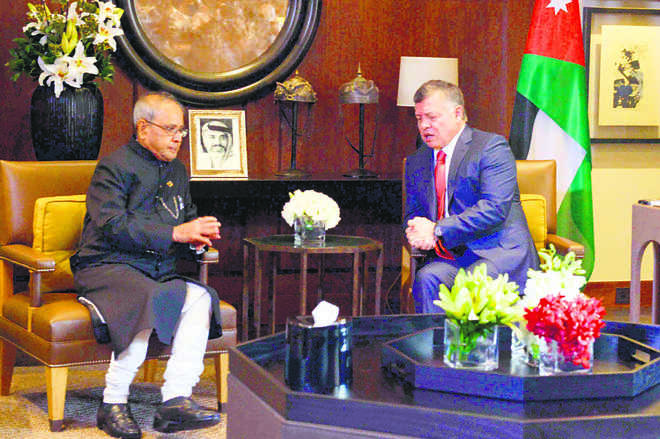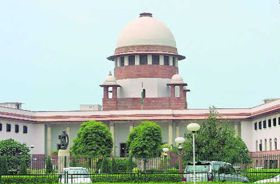
President Pranab Mukherjee with King Abdullah of Jordan during a meeting at the Al Husseinieh Palace in Amman. Mukherjee was on an official visit to Jordan. AFP
KV Prasad
ON the way back, after a "historic" trip to Jordan, Palestine and Israel, President Pranab Mukherjee succinctly summed up the the fine balancing act that India has to do in order to maintain diplomatic relations with countries in West Asia, especially those that have turbulent ties with each other.
The President said, “Twenty-three years ago, we established full-fledged diplomatic relations with Israel and are maintaining our stated principled position of relations with Palestine. Therefore, the Government of India has been doing this job for the last two-and-a-half decades”. He was responding to how New Delhi manages its ties with these two countries that have been caught in a fresh cycle of violence, resulting in nearly 50 deaths. Of those killed, the majority were Palestinians.
The six-day sojourn was momentous because it was the first trip by a Indian Head of State to these countries. Having worn different hats, including that of the External Affairs Minister on more than one occasion, Mukherjee is a veteran who has seen it all. He showed the willingness to swiftly adapt to the emerging situation and required sensitivities, when the presidential delegation reached Jerusalem after an overnight stay at Ramallah.
Implicit in the statement at the conclusion was the message that although India has traditional ties with Palestine and has supported its cause for decades, Israel remains one of the most important countries with which India has multi-dimensional relations. New Delhi is clear that it does not want to play any mediatory role in resolving the decades-old tangle that erupts violently ever so often. Yet, the take-home message was that both sides were for a peaceful settlement.
The Amman leg of Mukherjee's tour was meant to revitalise relations with Jordan. A high-level visit was to help in correcting the perception that New Delhi has been lukewarm in its approach towards Jordan in the last decade. This perception was conveyed by the leadership of Amman to India, during a ministerial-level meeting this year.
During the discussions with the Jordanian leadership, an important neighbour in the region, India maintained its principled support to the Palestinian cause. India called for a negotiated settlement that will result in a sovereign, independent, viable and united State of Palestine with East Jerusalem as its capital. This State with recognised borders will exist peacefully with Israel, as endorsed in the Quartet Roadmap and relevant UNSC resolutions. New Delhi reiterated the same position in Ramallah.
The Palestinian President Mahmoud Abbas thanked Mukherjee for being the first Head of a State to spend a night in Ramallah, the headquarters of the Palestinian National Authority. Most international leaders pay a visit to the place that in grand prix parlance is akin to a pit-stop
Yet, a sense of a section of Palestinian people being sullen over India's growing engagement with Israel could be felt, just as Israel’s citizens were irked that New Delhi did not criticise the attacks against its people by the Palestinians.
The demonstration by a large number of students inside Al-Quds University, minutes after Mukherjee made a speech asserting India's long-standing support and was honoured with an honorary doctorate, provided a glimpse of the undercurrents. The slogan-shouting crowd with posters sought to convey displeasure over deepening India-Israel ties. The angry protesters forced the cancellation of a scheduled event and their march disrupted the motorcade of the delegation that reached Jerusalem in separate groups, on the last leg of the tour.
Adding a new dimension to the simmering tension and spiralling violence in the holy city of Jerusalem was a report in Jerusalem Post that was critical of India's “silence” over “terror” attacks, largely knife stabbings, by Palestinians on Israelis. The attacks prompted Israeli authorities to push additional security on the ground. The Israeli response in shooting dead youth was described by President Abbas as "executions".
Mukherjee's opening remarks at the official reception were altered to include expression of distress over incidents of violence. To assuage the sentiments of the hosts, he underscored the position that India condemned all forms of terrorism. The next day's edition of Jerusalem Post carried a box with a headline: “Mukherjee finally finds voice against terrorism in Jerusalem”.
While Jordanian authorities told India that the Palestinian situation was a result of frustration over being denied rights, Husam Zomlot, the Ambassador at large and a senior policy advisor to the Palestine President, said there was no symmetry in the response by Israeli "occupation forces" against Palestinian youth. He was suggesting that though the "boys" may be mistaken in adopting violent means, it should be viewed in totality, especially when innocent Palestinians are being gunned down in cold-blood.
Interestingly, a BJP member in the delegation told The Tribune, that it is time India asked the Palestinians why they still continue to support Pakistan in the Organisation of Islamic Council and do not reciprocate India's principled stand in their favour. Yet, for those opposed to the BJP, the issue of Palestine was inextricably linked to the minority community in India and any change of stance could alienate this section. There are whispers that Prime Minister Narendra Modi may visit only Israel, which would be a "blunder," according to Zomlot's assessment. Whoever said, all politics is local.



























